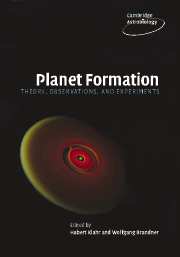Book contents
- Frontmatter
- Contents
- Preface
- Acknowledgments
- 1 Historical notes on planet formation
- 2 The Formation and Evolution of Planetary Systems: placing our Solar System in context
- 3 Destruction of protoplanetary disks by photoevaporation
- 4 Turbulence in protoplanetary accretion disks: driving mechanisms and role in planet formation
- 5 The origin of solids in the early Solar System
- 6 Experiments on planetesimal formation
- 7 Dust coagulation in protoplanetary disks
- 8 The accretion of giant planet cores
- 9 Planetary transits: a first direct vision of extrasolar planets
- 10 The core accretion–gas capture model for gas-giant planet formation
- 11 Properties of exoplanets: a Doppler study of 1330 stars
- 12 Giant-planet formation: theories meet observations
- 13 From hot Jupiters to hot Neptunes … and below
- 14 Disk–planet interaction and migration
- 15 The brown dwarf–planet relation
- 16 Exoplanet detection techniques – from astronomy to astrobiology
- 17 Overview and prospective in theory and observation of planet formation
- References
- Index
4 - Turbulence in protoplanetary accretion disks: driving mechanisms and role in planet formation
Published online by Cambridge University Press: 14 September 2009
- Frontmatter
- Contents
- Preface
- Acknowledgments
- 1 Historical notes on planet formation
- 2 The Formation and Evolution of Planetary Systems: placing our Solar System in context
- 3 Destruction of protoplanetary disks by photoevaporation
- 4 Turbulence in protoplanetary accretion disks: driving mechanisms and role in planet formation
- 5 The origin of solids in the early Solar System
- 6 Experiments on planetesimal formation
- 7 Dust coagulation in protoplanetary disks
- 8 The accretion of giant planet cores
- 9 Planetary transits: a first direct vision of extrasolar planets
- 10 The core accretion–gas capture model for gas-giant planet formation
- 11 Properties of exoplanets: a Doppler study of 1330 stars
- 12 Giant-planet formation: theories meet observations
- 13 From hot Jupiters to hot Neptunes … and below
- 14 Disk–planet interaction and migration
- 15 The brown dwarf–planet relation
- 16 Exoplanet detection techniques – from astronomy to astrobiology
- 17 Overview and prospective in theory and observation of planet formation
- References
- Index
Summary
Introduction
The observed characteristics of molecular clouds from which stars form can be reproduced by simulations of magnetohydrodynamic (MHD) turbulence, indicating the vital role played by magnetic fields in the processes of star formation. The fields support dense cloud cores against collapse, but they cannot do so indefinitely, because only charged particles couple to the field lines while neutral atoms and molecules can freely slip through. Through this process, called ambipolar diffusion, the cores slowly contract. The recombination rate in denser gas increases, causing the ionisation degree of the core to decrease. According to available observational data, once the core has contracted to ∼0.03 pc it decouples from the magnetic field and enters the dynamic collapse phase. During the collapse the angular momentum is locked into the core and remains unchanged (Hogerheijde, 2004).
Protostellar collapse and formation of disks
The typical specific angular momentum of a core on the verge of dynamic collapse, jc, amounts to ∼1021 cm2 s−1, and is many orders of magnitude larger than the typical specific angular momentum of a star (Hogerheijde, 2004). The inevitable conclusion is that the protostellar object resulting from the collapse must be surrounded by a large, rotationally supported disk (hereafter, protoplanetary disk) in which the original angular momentum of the core is stored. The outer radius of the disk, rd, may be roughly estimated based on Kepler's law.
- Type
- Chapter
- Information
- Planet FormationTheory, Observations, and Experiments, pp. 42 - 63Publisher: Cambridge University PressPrint publication year: 2006
- 3
- Cited by

